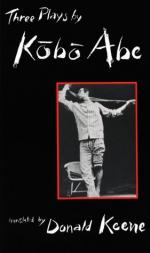|
This section contains 1,973 words (approx. 7 pages at 300 words per page) |

|
Encyclopedia of World Biography on Kobo Abe
An important figure in contemporary Japanese literature, Kobo Abe (1924-1993) attracted an international audience for novels in which he explored the nihilism and loss of identity experienced by many in post-World War II Japanese society.
Abe's works were often linked to the writings of Franz Kafka and Samuel Beckett for their surreal settings, shifting perspectives, grotesque images, and themes of alienation. The labyrinthine structures of his novels accommodated both precisely detailed realism and bizarre fantasy, and his use of symbolic and allegorical elements resulted in various metaphysical implications. Scott L. Montgomery stated: "Abe's most powerful books ... displace reality in order to highlight the fragility of an identity we normally take for granted."
Many critics contended that Abe's recurring themes of social displacement and spiritual rootlessness derived from his childhood in Manchuria, a region in northern China seized by the Japanese Army in the early 1930s, and by his...
|
This section contains 1,973 words (approx. 7 pages at 300 words per page) |

|


